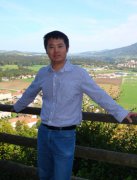郝宇
近期热点
资料介绍
个人简历
教育经历:2008/10 – 2012/10,德国汉堡大学,经济学系,经济学博士;2005/09 – 2008/06,北京师范大学,经济与资源管理研究院,经济学硕士;2001/09 – 2005/06,武汉大学,物理科学与技术学院/商学院,物理学学士,经济学学士(第二学位) 研究工作经历:2017/03 – , 北京理工大学,管理与经济学院,系主任2018/03 – , 北京理工大学,管理与经济学院,博士生导师2015/07 – , 北京理工大学,管理与经济学院/能源与环境政策研究中心,副教授2013/02 – 2015/06,北京理工大学,管理与经济学院/能源与环境政策研究中心,讲师郝宇,男,1983年2月生,湖北黄石人。武汉大学物理学与经济学双学士(2005)、北京师范大学经济学硕士(2008),德国汉堡大学经济学博士(2012)。现就职于北京理工大学管理与经济学院应用经济系/能源与环境政策研究中心,教授,博士生导师,应用经济系主任,兼任中国优选法统筹法与经济数学研究会能源经济与管理研究分会常务理事,Energy Economics, Ecological Economics, Energy Policy, Applied Energy, Applied Economics, Transportation Research Part D: Transport and Environment等学术杂志匿名评审。讲授高级宏观经济学、管理经济学、应用统计学、宏观经济学(双语)等课程。获2017年度霍英东教育基金会第十六届高等院校青年教师奖三等奖。指导多个本科生团队完成国家级和北京市级大学生创新训练项目,并获评2016年和2018年度北京理工大学“十佳优秀大学生创新训练项目”指导教师。目前的主要研究方向为宏观经济、能源经济、环境政策等,主持包括国家自然科学基金国际合作(中德)项目、国家自然科学基金青年项目在内的国家级和省部级纵向研究课题8项。迄今为止已在Energy Economics,Environment and Development Economics,Energy Policy,Applied Economics, Applied Energy,Journal of Cleaner Production,中国软科学 等国内外学术期刊发表学术论文七十余篇,其中以第一作者/通讯作者发表SCI/SSCI论文54篇(含ESI高被引论文4篇)。近期论文
近期发表的部分期刊论文和著作(通讯作者用*表示):[1] Hao, Yu*., Zhang, Tianli., Jing, Leijie., Xiao, Linqi. 2019. Would the decoupling of electricity occur along with economic growth? Empirical evidence from the panel data analysis for 100 Chinese cities. Energy 180: 615-625. (SCI)[2] Zhu, Lingyun., Hao, Yu*., Lu, Zhi-Nan., Wu, Haitao., Ran, Qiying. 2019. Do economic activities cause air pollution? Evidence from China’s major cities. Sustainable Cities and Society 49: 101593. (SSCI)[3] Hao, Yu., Wang, Ling-Ou., Lee, Chien-Chiang*. 2018. Financial development, energy consumption and China's economic growth: New evidence from provincial panel data. International Review of Economics & Finance (in press). DOI: 10.1016/j.iref.2018.12.006. (SSCI)[4] Wu, Haitao., Hao, Yu*., Weng, Jia-His. 2019. How does energy consumption affect China's urbanization? New evidence from dynamic threshold panel models. Energy Policy 127: 24-38. (SCI/SSCI)[5] Liu, Yunyang., Hao, Yu*. 2018. The dynamic links between CO2 emissions, energy consumption and economic development in the countries along “the Belt and Road”. Science of the Total Environment 645: 674–683. (SCI)[6] Chen, Heyin., Hao, Yu*., Li, Jingwei., Song, Xiaojie. 2018. The impact of environmental regulation, shadow economy, and corruption on environmental quality: Theory and empirical evidence from China. Journal of Cleaner Production 195: 200-214. (SCI)[7] Zhang, Zongyong., Hao, Yu*., Lu, Zhi-Nan., Deng, Yuxin. 2018. How does demographic structure affect environmental quality? Empirical evidence from China. Resources, Conservation & Recycling 133: 242-249. (SCI)[8] Zhang, Qianxue., Liao, Hua., Hao, Yu*. 2018. Does one path fit all? An empirical study on the relationship between energy consumption and economic development for individual Chinese provinces. Energy 150: 527-543. (SCI)[9] Zhang, Shengling., Li, Yue., Hao, Yu*., Zhang, Yipeng. 2018. Does public opinion affect air quality? Evidence based on the monthly data of 109 prefecture-level cities in China. Energy Policy 116: 299-311. (SCI/SSCI)[10] Huang, Junbing., Liu, Qiang., Cai, Xioachen., Hao, Yu*., Lei, Hongyan. 2018. The effect of technological factors on China's carbon intensity: New evidence from a panel threshold model. Energy Policy 115: 32-42. (SCI/SSCI)[11] Dong, Xiaoying., Hao, Yu.* 2018. Would income inequality affect electricity consumption? Evidence from China. Energy 142: 215-227. (SCI)[12] Hao, Yu*., Peng, Hui., Temulun, T., Liu, Liqun., Mao, Jie., Lu, Zhinan., Chen, Hao. 2018. How harmful is air pollution to economic development? New evidence from PM2.5 concentrations of Chinese cities. Journal of Cleaner Production 172: 743-757. (SCI,2018年9月入选ESI高被引论文)[13] Hao, Yu*., Peng, Hui. 2017. On the convergence in China's provincial per capita energy consumption: New evidence from a spatial econometric analysis. Energy Economics 68C: 31-43. (SSCI)[14] Hao, Yu*., Zheng Shaoqing. 2017. Would environmental pollution affect home prices? An empirical study based on China’s key cities. Environmental Science and Pollution Research 24: 24545-24561. (SCI)[15] Liu, Yiming., Hao, Yu*., & Gao, Yixuan. 2017. The environmental consequences of domestic and foreign investment: Evidence from China. Energy Policy 108, 271-280. (SCI/SSCI)[16] Zhang, Qianxue., Zhang, Shengling., Ding, Zhiyi., Hao, Yu*. 2017. Does Government Expenditure affect Environmental Quality? Empirical Evidence Using Chinese City-level Data. Journal of Cleaner Production 161: 143-152. (SCI)[17] Chang, C.-P., Hao, Yu*. 2017. Environmental performance, corruption and economic growth: global evidence using a new data set. Applied Economics 49(5): 498-514. (SSCI)[18] Hao, Yu*., Zhang, Zong-Yong., Liao, Hua., Wei, Yi-Ming., Wang, Shuo. 2016. Is CO2 emission a side effect of financial development? An empirical analysis for China. Environmental Science and Pollution Research. 23(20): 21041-21057. (SCI)[19] Hao, Yu*., Chen, Heyin., Zhang, Qianxue. 2016. Will income inequality affect Environmental Quality? -- Analysis Based on China's Provincial Panel Data. Ecological Indicators 67: 533-542. (SCI)[20] Hao, Yu*., Liu, Yi-Ming. 2016. The influential factors of urban PM2.5 concentrations in China: a spatial econometric analysis. Journal of Cleaner Production 112: 1443-1453. (SCI,2016年 11月入选ESI高被引论文)[21] Hao, Yu*., Chen, Hao., Wei, Yi-Ming., Li, Yi-Mei. 2016. The influence of climate change on CO2 (carbon dioxide) emissions – An empirical estimation based on Chinese provincial panel data. Journal of Cleaner Production 131: 667-677. (SCI,2017年 11月入选ESI高被引论文)[22] Hao, Yu*., Zhang, Zong-Yong., Liao, Hua., Wei, Yi-Ming. 2015. China’s farewell to coal: A forecast of coal consumption through 2020. Energy Policy 86: 444-455. (SSCI/SCI,2018年5月入选ESI高被引论文)[23] Hao, Yu., Liao, Hua, Wei, Yi-Ming*. 2015. Is China’s carbon reduction target allocation reasonable? An analysis based on carbon intensity convergence. Applied Energy 142: 229–239. (SCI)[24] Hao, Yu., Wei, Yi-Ming*. 2015. When does the Turning Point in China’s CO2 Emissions Occur? Results Based on the Green Solow Model. Environment and Development Economics 20(6): 723-745. (SSCI)[25] Hao, Yu*., Zhang, Qianxue., Zhong, Ming., Li, Baihe. 2015. Is there convergence in per capita SO2 emissions in China? An empirical study using city-level panel data. Journal of Cleaner Production 108: 944-954. (SCI)[26] Huang, Junbing., Hao, Yu., Lei, Hongyan. 2017. Indigenous versus foreign innovation and energy intensity in China. Renewable and Sustainable Energy Reviews 81(2): 1721-1729. (SCI)[27] Wen, Jun., Hao, Yu., Feng, Gen-Fu., Chang, Chun-Ping*. 2016. Does government ideology influence environmental performance? Evidence based on a new dataset. Economic Systems 40(2): 232–246. (SSCI)[28] Liu, Yanan., Gao, Yixuan., Hao, Yu., Liao Hua. 2016. The relationship between residential electricity consumption and income: A piecewise linear model with panel data. Energies, 9(10): 831. (SCI)[29] 郝宇, 赵明远,高尚. 新贸易形势下中国能源经济预测与展望,北京理工大学学报(社会科学版),第2期,12-19页,2019. (CSSCI)[30] 郝宇, 王泠鸥, 吴烨睿. 新时代中国能源经济预测与展望,北京理工大学学报(社会科学版),第2期,8-14页,2018. (CSSCI)[31] 郝宇, 郑少卿, 彭辉.“供给侧改革”背景下中国能源经济形势展望,北京理工大学学报(社会科学版),第2期,28-34页,2017. (CSSCI)[32] 郝宇,张宗勇,廖华. 中国能源“新常态”:“十三五”及2030年能源经济展望,北京理工大学学报(社会科学版),第2期,1-7页,2016. (CSSCI)[33] 郝宇,廖华,魏一鸣. 中国能源消费和电力消费的环境库兹涅茨曲线:基于面板数据空间计量模型的分析,中国软科学,[34] 魏一鸣,廖华,唐葆君,郝宇. 中国能源报告(2016):能源市场研究. 科学出版社,2016.[35] 魏一鸣,廖华,王科,郝宇. 中国能源报告(2014):能源贫困研究. 科学出版社,2014.[36] Hao, Yu. 2015. Energy Consumption and Economy Development: An Empirical Case Study for China. The Handbook of Clean Energy Systems. April, 2015. John Wiley & Sons. 相关热点

